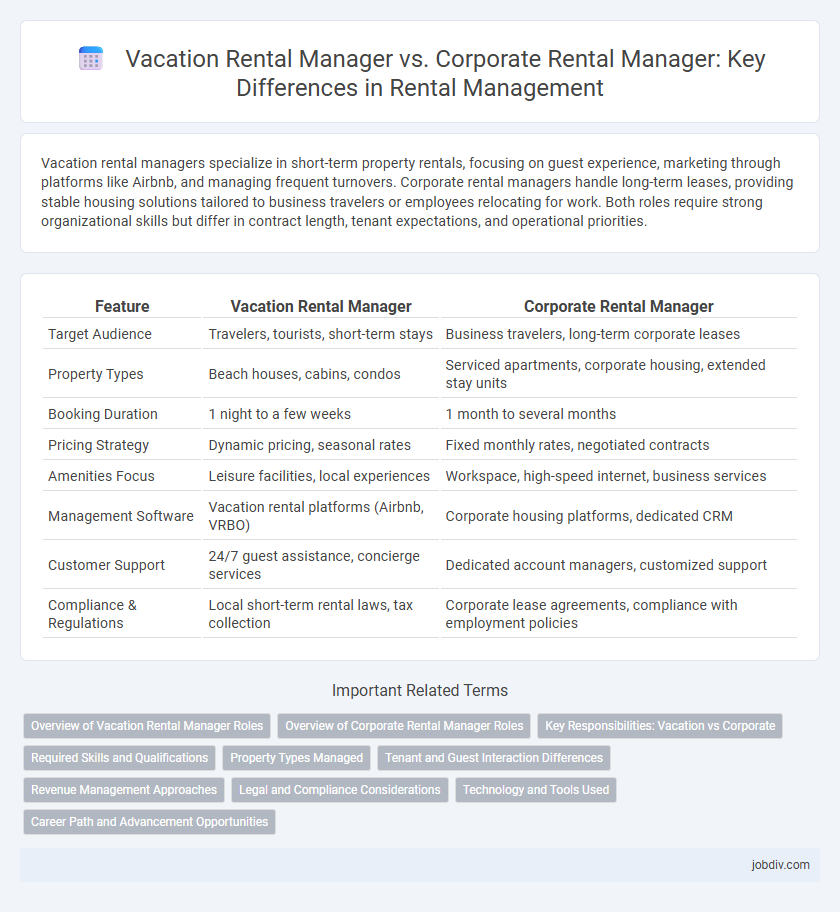Vacation rental managers specialize in short-term property rentals, focusing on guest experience, marketing through platforms like Airbnb, and managing frequent turnovers. Corporate rental managers handle long-term leases, providing stable housing solutions tailored to business travelers or employees relocating for work. Both roles require strong organizational skills but differ in contract length, tenant expectations, and operational priorities.
Table of Comparison
| Feature | Vacation Rental Manager | Corporate Rental Manager |
|---|---|---|
| Target Audience | Travelers, tourists, short-term stays | Business travelers, long-term corporate leases |
| Property Types | Beach houses, cabins, condos | Serviced apartments, corporate housing, extended stay units |
| Booking Duration | 1 night to a few weeks | 1 month to several months |
| Pricing Strategy | Dynamic pricing, seasonal rates | Fixed monthly rates, negotiated contracts |
| Amenities Focus | Leisure facilities, local experiences | Workspace, high-speed internet, business services |
| Management Software | Vacation rental platforms (Airbnb, VRBO) | Corporate housing platforms, dedicated CRM |
| Customer Support | 24/7 guest assistance, concierge services | Dedicated account managers, customized support |
| Compliance & Regulations | Local short-term rental laws, tax collection | Corporate lease agreements, compliance with employment policies |
Overview of Vacation Rental Manager Roles
Vacation rental managers oversee short-term property rentals, coordinating guest bookings, property maintenance, and hospitality services to ensure a seamless vacation experience. They handle marketing on platforms like Airbnb and Vrbo, manage check-ins/check-outs, and resolve guest issues promptly. Their role emphasizes maximizing occupancy rates and guest satisfaction through personalized service and local area knowledge.
Overview of Corporate Rental Manager Roles
Corporate Rental Managers oversee leasing operations for business clients, focusing on long-term contracts and tailored property solutions. They coordinate corporate accounts, manage client relationships, and ensure compliance with company policies and legal regulations. Expertise in contract negotiation, financial management, and strategic planning is essential for optimizing occupancy and profitability in corporate rental portfolios.
Key Responsibilities: Vacation vs Corporate
Vacation Rental Managers specialize in overseeing short-term property rentals, including guest communications, booking management, cleaning coordination, and marketing on platforms like Airbnb and Vrbo. Corporate Rental Managers handle long-term leases for businesses, focusing on contract negotiations, tenant relations, property maintenance, and compliance with corporate housing standards. Both roles require strong organizational skills but differ significantly in their target clientele, lease durations, and operational priorities.
Required Skills and Qualifications
Vacation Rental Managers require strong customer service skills, expertise in short-term rental platforms like Airbnb and VRBO, and the ability to manage property turnovers efficiently. Corporate Rental Managers need advanced negotiation skills, knowledge of long-term lease agreements, and experience in managing relationships with corporate clients and vendors. Both roles benefit from proficiency in property management software and strong organizational abilities.
Property Types Managed
Vacation Rental Managers specialize in short-term rental properties such as vacation homes, condos, and beachfront villas designed for leisure travelers. Corporate Rental Managers focus on long-term housing solutions including serviced apartments, executive suites, and corporate housing units tailored to business clients. Each manages property portfolios suited to distinct tenant needs and leasing durations, optimizing occupancy and revenue strategies accordingly.
Tenant and Guest Interaction Differences
Vacation Rental Managers prioritize personalized guest experiences, often handling direct communication, special requests, and immediate problem resolution to ensure memorable stays. Corporate Rental Managers focus on maintaining consistent tenant relations through standardized communication protocols, lease compliance, and long-term tenant satisfaction. Guest interaction in vacation rentals typically involves short-term hospitality services, whereas corporate rentals emphasize professional, contract-based tenant management.
Revenue Management Approaches
Vacation rental managers prioritize dynamic pricing models that adjust rates based on seasonality, local events, and booking trends to maximize occupancy and revenue. Corporate rental managers often implement more structured, long-term pricing strategies that focus on steady cash flow, incorporating negotiated contracts and volume discounts to maintain consistent income. Both approaches leverage data analytics, but vacation rentals emphasize demand-driven flexibility while corporate rentals prioritize predictability and client retention.
Legal and Compliance Considerations
Vacation rental managers must navigate local zoning laws, short-term rental regulations, and guest safety standards to maintain compliance and avoid fines. Corporate rental managers face stricter compliance with rental housing laws, employee housing regulations, and complex lease agreements governing longer-term leases. Both roles require thorough understanding of liability insurance requirements and adherence to consumer protection laws specific to their rental type.
Technology and Tools Used
Vacation Rental Managers utilize specialized platforms like Airbnb, Vrbo, and guest communication tools to streamline bookings and enhance guest experiences. Corporate Rental Managers rely on integrated property management systems (PMS) such as Yardi or RealPage, combined with advanced analytics and automated lease management for efficient portfolio oversight. Both roles leverage mobile apps and cloud-based software, but Vacation Rental Managers emphasize guest interaction technologies, whereas Corporate Managers focus on operational scalability and compliance tools.
Career Path and Advancement Opportunities
Vacation rental managers typically advance by gaining expertise in property marketing, guest relations, and short-term rental platforms, often moving into regional management or consulting roles within the hospitality sector. Corporate rental managers focus on fleet management, client contracts, and long-term rental strategies, with career paths leading to senior operations, corporate leasing director, or real estate portfolio management positions. Both careers offer opportunities for specialization, but corporate rental management tends to provide more structured advancement within large organizations, while vacation rental management emphasizes entrepreneurial skills and flexible, client-focused growth.
Vacation Rental Manager vs Corporate Rental Manager Infographic

 jobdiv.com
jobdiv.com